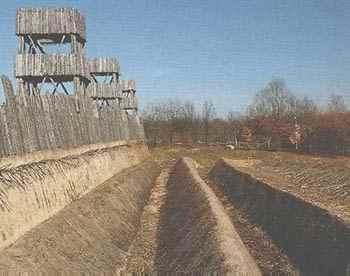Jupiter Optimus Maximus
"Go get more wood for the fire and I will tell you a story from the wars," said the old Centurion, while warming his hands over the dimming embers. Flavius, the younger of the three men that met on the road to Massilia and were now travelling together, stood up and went around collecting any dry branches in the field of view. It had been a cold day and it would be a cold night, it would be wise to go for another cargo of wood after the older man, Vesperius, finished his tale.

(Image: archaeological reconstruction of the siege walls built by the Roman Army at Alesia)
The trio sat by the fire to eat and rest for the night, they still had one more day to walk before they reached the Narbonensis capital and finally be allowed to rest under a roof before finding a ship to take them to Rome. Traveling the roads of the Empire, pilgrims often grouped together for companionship, as well as safety from bandits. Sharing the road and the destination, but often, as is the case, all with different objectives. Flavius, a cobbler, on his way to the greatest city there ever was, to look for fame in his trade, Marius, a farmer, on his way to present a complaint to justice, on a matter of the inheritance of some lands from a relative, and Vesperius, a retired soldier, on his way to the Temple of Jupiter Optimus Maximus to make the offering of a sacrifice to the God.
"I was traveling, a couple of hundred miles to the North of here, on my way to join the Triarii of the Tenth, under Iulius Caesar. My cohort had been left behind, guarding Lungdunum while the full weight of the Legions moved up to lay siege to Alesia. Scouting the route, one day ahead of the others, I found an old man on the road and stopped him to ask him for news and rumours, when I realised that the old man was blind and travelling alone, on his way to Saguntum. I was surprised by the notion that he could do it." Pausing to take a bite out of a piece of bread, Vesperius took a broad look around into the shadows that were forming in the forest as the sun set.
"I had just asked the blind man for any news from the road ahead, when he said to me: - Vesperius, you will be going to battle, soon. Remember to sacrifice to Jove, for he will save your life. Those are the only news I have for you." Flavius looked at him in amazement: "-How did he know your name? Had you met him before?" The soldier looked back at him, firmly. "I was as surprised as you are, my young friend, but I made my way to Alesia and offered a pigeon to the God as soon as I re-joined the Legion." Marius, who seemed a bit absent up to this point, then took a keen interest in the story: "- and what happened then? Go on. Tell us!"
"Two days later, we were surrounded by the Gauls. There were ten of them for every one of us. We fought for days, always on the edge between life and death. On the second day of the battle I was sent out to spy on the enemy's movements and was caught outside the fort by a pair of barbarians on horses. I was on foot and out of my armour for the need of speed and silence of my mission." The two listeners were now looking at him with an air of incredibility. "As one of the Gauls was about to spear me to death, a small snake came out of the ground and the horses panicked and made their riders fall down. I ran as fast as I could and made my way back to the wall. I know my life was spared that day, and that is why, now that my service to the Legion is over, even after all these years, my first duty is to go visit the Image of the God, in Rome and offer a proper sacrifice to thank Him for saving my life."
28.01.25 - @Hefestus
Author's note: This short story is loosely based on historical facts decribed in Comentarii de Bello Gallico by Julius Caesar. It is an imaginary account of what could have happened to one out of the thousands of Roman soldiers that took part in those events. Locations, unit names and troop movements herein described are based upon what is known about the history of the period. As an interpretation assistance, one can add that, according to the appropriate mythology, Jupiter was known to transform Himself into animal shapes when he decided to weight in on the mortal's lives, snakes and eagles being the most notable cases.
Cool! And interesting. The world obviously doesn't quite agree on the Roman gods... Some of the publications on the subject place them quite calmly on Olympus, the mountain of the Greek gods. The other part does not grant them a kind of residence; there the deities are manifested in the elements and natural phenomena. The latter reading is more sympathetic to me, as it does not take as its starting point all-dominant figures, but rather the sublimity in everything around us...
So much has been said about Jupiter before, (both the planet and the divinity), that it is probably futile to try to walk that street. I just looked for a relatable, everyday experience from a long, long time ago. It's easier, for me, to talk about human things than about godly things.
The core problem of all religions, I guess ;-))